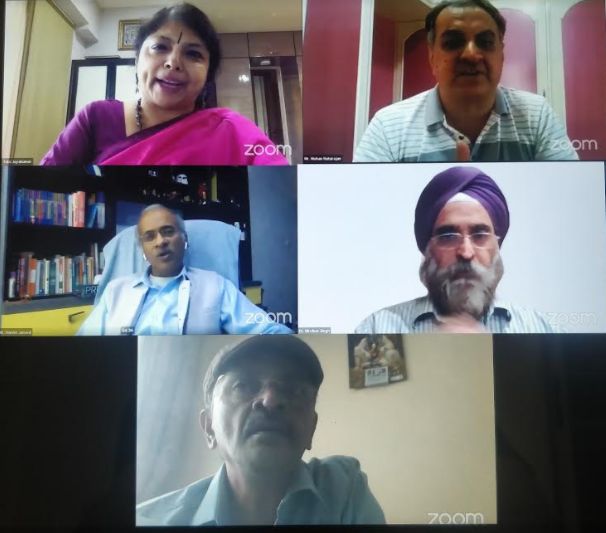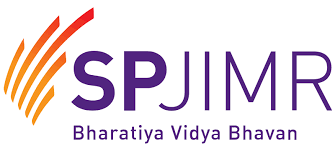SPJIMR Organises Webinar to Understand the Challenges Faced by MSMEs
Mumbai, Maharashtra, India
The Centre for Family Managed Business (CFMB) and The Centre for Financial Studies (CFS) of Bharatiya Vidya Bhavan’s SPJIMR, a top ranked management Institute, recently organised a webinar on “MSMEs- Breaking out of the Chakravyuh”. Dr. Nirvikar Singh–Professor of Economics, University of California, Santa Cruz, Mr. Vardhan TR – MD, Mascot Systems Private Limited and Mr. Manish Jaiswal–MD and CEO, Magma Housing Finance and SME Business were the panel members. The discussion was moderated by Dr. Tulsi Jayakumar, Professor Economics and Chairperson–Family Managed Business,SPJIMR and hosted by Mr. Mohan Natarajan, MD and India Head–Avista Advisory and an advisor to the CFS.
 |
Participants at the Webinar on MSMEs
CFMB is a leader in the study of family managed businesses in India and overseas and has facilitated dissemination of knowledge in this area to numerous family businesses. CFS is a centre of excellence in finance set up by SPJIMR to bring together academics, practitioners and policy makers in the field of finance and to be a thought leader in various areas of finance.
The discussion began with an analysis of the challenges faced by MSMEs. Especially after the recent change in definition of MSMEs, data reveals that over 99% of businesses in India are MSMEs, which indeed makes the sector crucial for the growth of the economy. The discussion moved towards understanding India’s small and mid-size business representation as compared to the world. It revealed that India is relatively underrepresented in this category as compared to the global numbers. The main reason highlighted for this was financing. The cost of funds for these businesses has always been on a higher end. Banks have been circumspect in lending funds to this sector out of the fear that any money lent to this sector could turn bad. These apprehensions have made it difficult for MSMEs to tap funds and grow their business.
Second important point discussed in this regard was the ease of doing business. There are various complexities for MSMEs especially when it comes to dealing with large companies and government entities. The global pandemic seems to have hurt the MSME sector much more than it has hurt larger enterprises. Having said that one of the panellists even pointed to the opportunities that the present geopolitical situation could offer the Indian MSMEs and how these firms could harness them.
Receivables Management for MSMEs was an important point that was discussed at length. Larger corporates and governments which are the major customer base for the MSMEs are at a much stronger position than these businesses. The corporates and government tend to take advantage of their position and offer terms of business heavily skewed towards their own benefit. One of the panellists mentioned how he has seen some of the MSMEs face large unpaid bills problems affecting their cash management. This causes pain in running their business operations smoothly.
Manish Jaiswal mentioned that when the moratorium was initially announced, more than 50% of MSME accounts were under moratorium. However, the current number stands at 25% which reflects a softer revival of MSME businesses. They also discussed about the regional disparities in the MSME performance. Businesses in the North have been stronger than those in western and central regions etc.
Dr. Nirvikar also threw light on how the situation of MSMEs in USA is different from that in India in that the relationship with other constituents like large companies and government is less adversarial.
The panellists further went on to discuss how COVID-19 could likely change the business models of MSMEs. Mr. Manish Jaiswal mentioned that it is now important for MSME businesses to consider making their businesses-asset light, reduce fixed cost, shed off excess baggage of assets, survive the crisis and look for new opportunities through the crisis. Mr. Vardhan also pointed that businesses could consider contribution margin rather than gross margin as the basis for taking calls on business growth. It will help them better analyse their standing and help in better decision making.
They further discussed the viability of the fiscal stimulus announced by the government. They noted that the 3-lakh crore stimulus was a credit facility which means that the amount would have to be paid back by the firms. Also, it was available only to those businesses which already have a loan account and not to new businesses. Further it seems to have percolated only to the better performing MSMEs. Their discussions thus identified where the problems lay. Dr. Nirvikar mentioned that the stimulus is more focused on credit rather there should be more targeted support to the MSMEs. He also added to the discussion that people have been taking the opposite view due to inflation expectations and fiscal deficit concerns. The discussions pointed that fiscal deficit though is an important consideration but right now reviving the economy and pushing the demand should be in focus and the measures should be designed accordingly. The panellists also suggested that MSMEs should look at revising their cost structures downward as COVID-19 has created a fog of uncertainty and consumption is not likely to go up drastically very soon.
Discussions further went on towards digitisation. The panellists discussed the importance of being adaptable to change for the MSMEs and how digitisation could be used in cases of mass product. While highlighting the issues in technological adoption, they mentioned how supply side wasn’t the issue. The issue was present on the demand side and how there exists gaps because of the lack of skill set. The panellists also suggested that MSMEs should take a long-term view and hire the best that can push their businesses ahead. The discussions also highlighted the growth of ecommerce. They pointed out how the spending patterns of consumers has changed and how the MSMEs could take reap benefits out of this.
The webinar received an overwhelming response and the audience poured in number of questions for the panellists which brought out helpful ideas for the MSME businesses to deal with the challenges that surround them.
(Disclaimer: The above press release comes to you under an arrangement with NewsVoir India and this publication takes no editorial responsibility for the same.)



